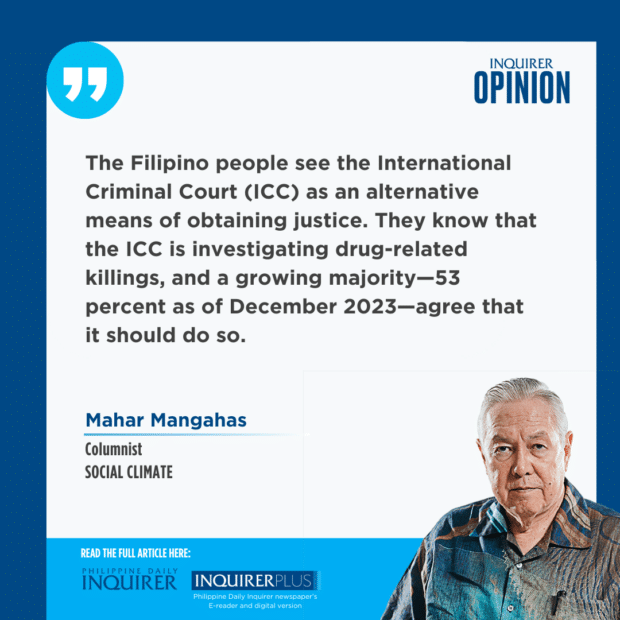Our unsafe country

In June 1985, 54 percent of Filipinos surveyed nationwide said people in their neighborhood were usually afraid that their homes might be broken into, and 48 percent said that their streets were unsafe to walk at night. That survey was by the Bishops-Businessmen’s Conference for Human Development, a forerunner of Social Weather Stations (SWS), which then repeated it twice a year from 1986 to 1991, and quarterly from 1992 onward.
Rates of fearfulness in the neighborhood. Recently, in the four SWS national surveys of 2023, the average fearfulness of burglary was 53 percent, and the average with streets unsafe to walk at night was 43 percent, or very little improvement after 35 years.
In 2005, SWS added a question about the presence of drug addicts in the neighborhood, and an average of 42 percent said there were many of them. This average had grown to 56 percent in 2016, when Rodrigo Duterte became president. It did subside to 33 percent in the three surveys of 2021, the last full year of his term.
Yet, in the four SWS surveys of 2023, now under President Marcos, the average visibility of drug addicts was 39 percent, or hardly below its starting level of 42 in 2005.
Hence, the people’s feelings of insecurity in the neighborhood have hardly changed after four decades. The time charts of SWS survey data on public safety, as well as on many other topics, may be seen in “The 2024 SWS Survey Review,” by SWS vice president/COO Gerardo “Jay” A. Sandoval, as presented at the Asian Institute of Management, (www.sws.org.ph, 2/08/2024).
Rates of victimization by crime. Feeling insecure is one thing, and being actually victimized is another. In 1989, the SWS national surveys began to ask its respondents whether anyone in their families had experienced, in the past six months, (a) burglary of the home, (b) robbery in the streets by snatching or pickpocketing, or (c) suffered from a violent crime. In the two surveys that year, on average, burglary was experienced by 7 percent, snatching by 16 percent, and violence by 4 percent. In 1993, SWS added motor vehicle (MV) theft and found that 6 percent, on average, had experienced it.
Three decades later, in the four 2023 surveys, the average victimization rates were about 2 percent for burglary, 4 percent for snatching, 0.4 percent for violence, and also 0.4 percent for MV theft. Newly added in 2023 was cybercrime (online scamming, hacking, or bullying); this was experienced by 3 percent, on average.
(These percentages are applicable to a base number of families since the question is about family experience; one percentage point is now equivalent to 270,000 cases. Furthermore, these are six-month case rates and should be doubled when compared with annual crime rates reported to the police. Incidentally, other surveys also show that many victims do not report their cases, feeling it is futile.)
Former president Rodrigo Duterte’s bloody approach to fighting illegal drugs was abusive and unacceptable. This was demonstrated long ago—see “Fourth Quarter 2019 Social Weather Survey: 76% of Filipinos see many human rights abuses in the administration’s war on illegal drugs, 24% see few,” (www.sws.org.ph, 1/15/20).
Very few Filipinos believed the nanlaban or “fought back” excuse for Duterte’s bloody war against illegal drugs. Eight successive national surveys in 2016-2019 had the same findings, as reported in “Third Quarter 2019 Social Weather Survey: 29% of Pinoys do not believe police claims of ‘nanlaban,’ 26% believe, and 45% are undecided,” (www.sws.org.ph, 12/22/23).
The Filipino people see the International Criminal Court (ICC) as an alternative means of obtaining justice. They know that the ICC is investigating drug-related killings, and a growing majority—53 percent as of December 2023—agree that it should do so.
Furthermore, the majority feel that the government should cooperate with the ICC’s investigation—see “Social Weather Report: Sufficient/extensive knowledge of Filipinos about the ICC investigation on the drug-related killings under Duterte rises to 43% last December 2023 from 33% in March 2023,” (www.sws.org.ph, 2/20/24).
Many thought Duterte was only kidding when, during his campaign for the presidency in 2016, he referred to the Philippines as a “province of China.” Thankfully, almost no one has followed his lead in trusting that country.
—————-
Contact: mahar.mangahas@sws.org.ph
















